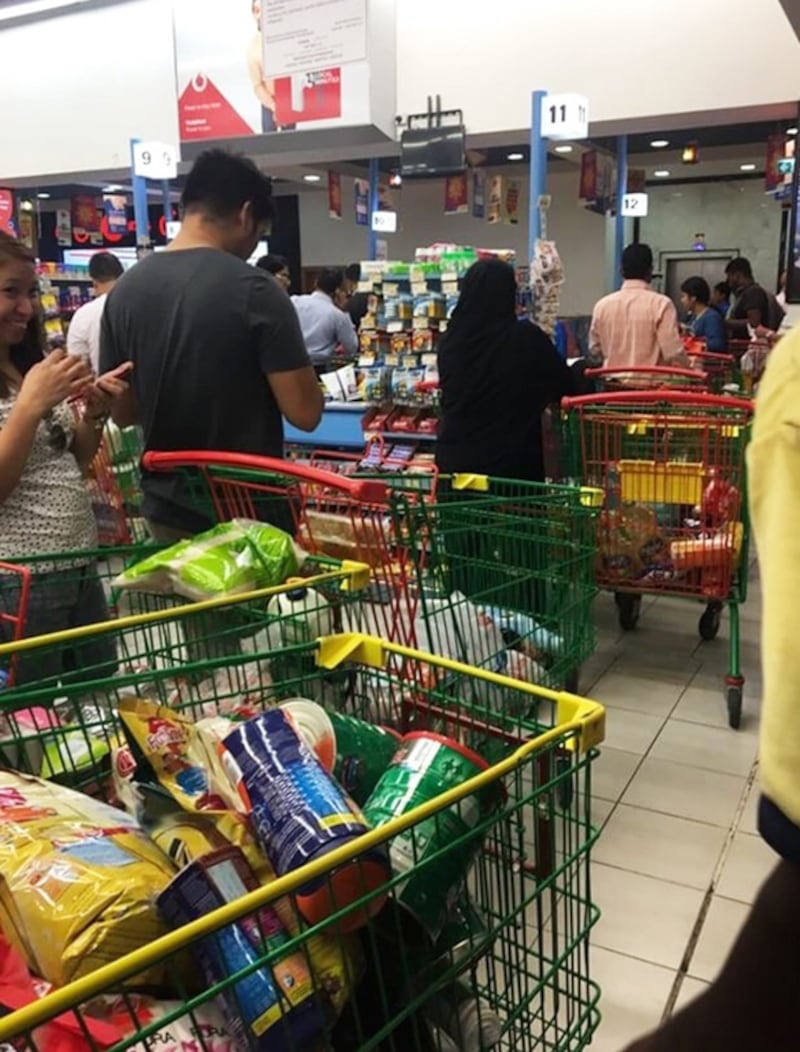ABU DHABI // Qatar residents rushed to stock up food supplies on Monday following news that Saudi Arabia would close the country’s only land border, leaving some supermarkets with rows of empty shelves.
By late afternoon, strawberry milk was the only item left in the dairy aisle of one Doha supermarket, while the poultry section was also sparse.
“It has potential to get very serious ... as the shops are emptying out,” said one British expat shopper. “Milk and chicken are disappearing as these are imported from Saudi [Arabia].”
“If Nutella runs out, this place will go mad,” the shopper added jokingly.
Images shared on social media showed crowds of shoppers pushing trolleys piled high with food, water and other drinks.
“Stores are busy enough in #Doha, #Qatar during Ramadan. But #Saudi border closures and looming food shortages are an even crazier scene,” wrote Twitter user Allison Furlong.
Qatar imports around 90 per cent of its food, much of it through its sole land border crossing at Abu Samra. Al Jazeera reported on Monday that lorries carrying food bound for Qatar were lined up on the Saudi side of the border, apparently unable to cross.
Journalist Sally Bruce, who works between Doha and Dubai, said friends in the peninsula had already begun bulk-buying food.
“My friends living there have said it is chaotic, with people rushing into supermarkets as if they are preparing for the apocalypse,” said Ms Bruce, who lives in Dubai but works for the Doha-based I Love Qatar lifestyle site.
“They are hoping it will blow over.”
The move to close the Saudi-Qatari border came as Riyadh, the UAE, Bahrain and Egypt severed diplomatic ties with Doha and cut off land, sea and air routes.
Ms Bruce, a mother-of-one, said the website she works for has already been impacted by the crisis.
“I know the website has had non Qatar-based sponsors pull out since the announcement,” she said.
With Qatar producing very little, it is heavily reliant on imports of goods arriving in the form of re-exports from UAE ports or on lorries travelling through Abu Samra.
In 2014, The National reported that about 800 lorries a day passed through the Abu Samra crossing, according to Qatar's customs department. These lorries contained goods including food and construction materials – everything from concrete to rebar – from the UAE, Saudi Arabia, Jordan, Lebanon and Egypt.
Trade sources said on Monday that the UAE and Saudi Arabia had stopped exports of white sugar to Qatar. Doha is reliant on the two countries for its white sugar imports, which are estimated at less than 100,000 tonnes annually. Consumption is higher during Ramadan.
Qatar insisted, however, that the border closing would not impact day-to-day life for the country’s citizens and residents.
“The Council would like to reassure Qatar’s citizens and residents that the government had already taken the necessary measures and precautions to ensure that normal life continues, and that there will be no negative impact caused by the latest measures,” the government said in a statement.
“In addition, sea ports will continue to be open for trade, and air space will continue to be open for trade, transport and air travel, with the exception of the countries that have closed their borders and air space.”
Meanwhile, an Iranian official said his country could export food to Qatar by sea, the semi-official Fars news agency reported.
Reza Nourani, chairman of the union of exporters of agricultural products, said food shipments sent from Iran could reach Qatar in 12 hours.
* With reporting by Associated Press and Reuters






